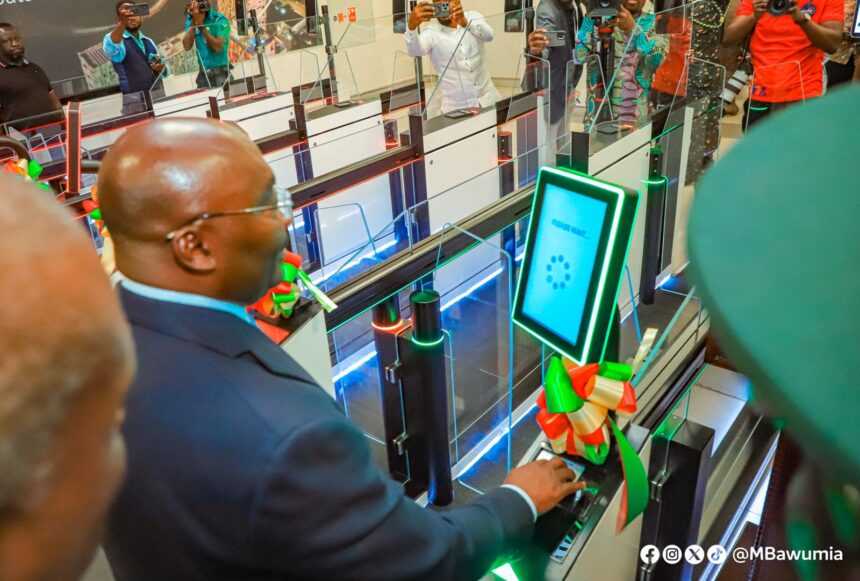The Ghana Immigration Service (GIS) has issued a strong rebuttal to claims circulating on social media and other platforms suggesting that the e-Gates system deployed at the Kotoka International Airport (KIA) cost the Ghanaian taxpayer a staggering $240 million.
In a press release signed by Deputy Commissioner of Immigration Maud Anima Quianoo, the GIS provided detailed clarification to address what it described as “false claims” and misinformation.
According to the GIS, the $240 million figure being referenced in social media discussions is grossly misleading.
“The Ghana Immigration Service is implementing a new integrated border management system known as the ‘Immigration 360’. The system seeks to fully automate passenger processing and data management at all the forty-eight (48) approved entry/exit points to Ghana and other operational commands.
“The new system seeks to address challenges with sovereignty, interoperability and other inadequacies associated with the existing systems installed at twelve (12) approved borders.”
Maud Anima Quianoo, Deputy Commissioner of Immigration
The service clarified that the e-Gates system at KIA—comprising 15 units of e-Gates with accessories—cost $1.7 million ($1,760,479.80) with the total cost for phase one of the immigration control systems, including the e-Gates at KIA being $5.5 million ($5,548,860.89).
The GIS further emphasised that the claims fail to consider the broader context of the “Immigration 360” integrated border management system, which the service is rolling out across all 48 approved entry and exit points in Ghana.
The Actual Cost Vrs. The $240 Million Misinterpretation
Furthermore, the statement noted that the “Immigration 360″ project, designed to enhance passenger processing, data management, and border security, is valued at $94.6 million ($94,664,374.57). GIS clarified that this figure represents the initial implementation cost of the system.
GIS also explained that the $240 million figure being circulated is not for the KIA e-Gates system alone but reflects the project’s total cycle cost over 10 years, including the initial implementation cost of $94,664,374.57. This amount includes: two wholesale upgrades of critical system components during the 10 years.
“The first upgrade type is in three (3) replacement cycles of key components of the system. The second upgrade type is two (2) 5-year upgrade cycles within ten (10) years to replace major components of the technical infrastructure.
“This is to ensure a refresh of the system at all times and to ensure the handback of a brand-new system at the end of the ten-year period.”
Maud Anima Quianoo, Deputy Commissioner of Immigration
Additionally, the statement indicated that after accounting for VAT and other taxes, the total cost of the project comes to $274 million, which includes maintenance and hands-on support services over ten years to guarantee the system is operational around the clock.

The GIS highlighted the advanced capabilities of the “Immigration 360” system, which integrates seamlessly with both local and international databases, including Ghana’s National Identification System (NIS) and Driver and Vehicle Licensing Authority (DVLA).
It also noted that the e-gate would afford International platforms such as INTERPOL’s Global Stop/Watch List, ICAO’s Public Key Directory (PKD), and the Advanced Passenger Information (API) system.
According to the statement, this integration ensures robust security, smooth passenger clearance, and trade facilitation while addressing challenges such as sovereignty and interoperability inherent in the older systems.
A key feature of the project is the financing arrangement. GIS disclosed that Margins ID Systems Application Ltd (MIDSA), a local Ghanaian company, is pre-financing the $94.6 million implementation cost, adding that the government will repay this amount using revenue generated from the system.
GIS reiterated its commitment to transparency and urged the public to disregard misleading reports on the cost of the e-Gates system.
The service emphasized that the “Immigration 360″ project represents a significant step forward in Ghana’s border management strategy, ensuring seamless integration with national and international systems and offering enhanced security and efficiency for the country.
For further clarification, GIS encouraged the public to contact the Public Affairs Department.
READ ALSO: Petroleum Demand Surges in Ghana Amid Forex Fluctuation Risk






















